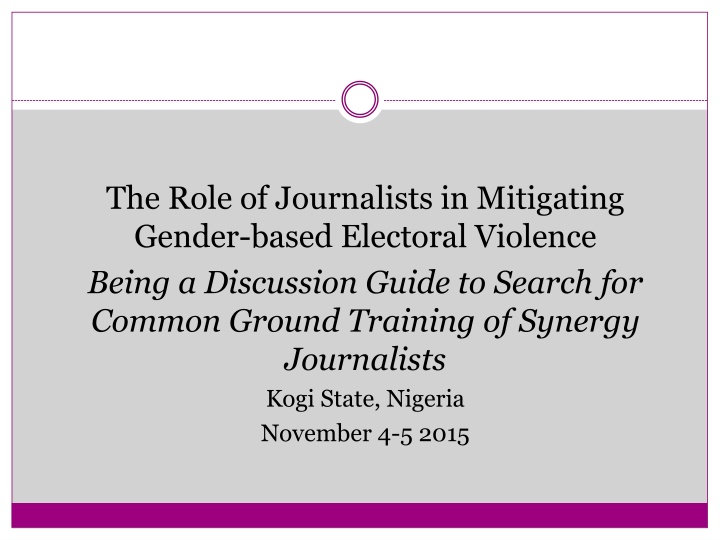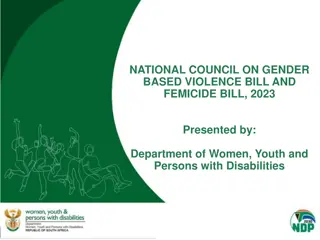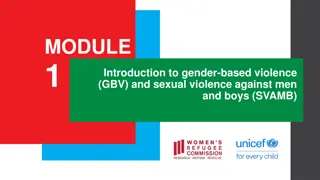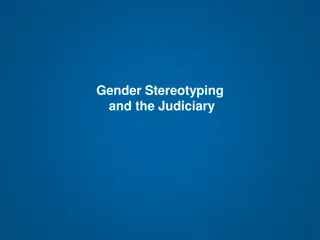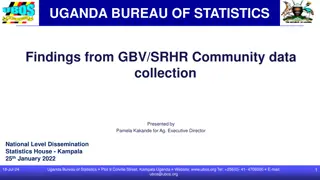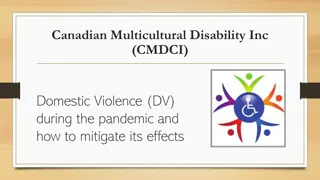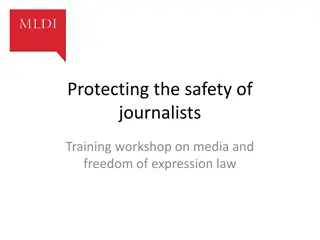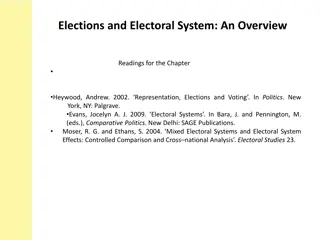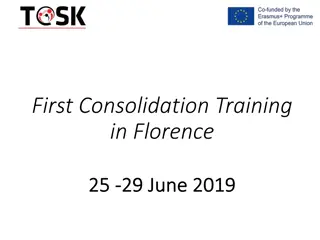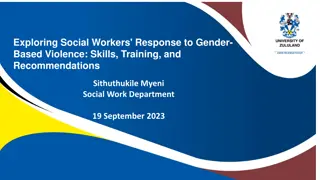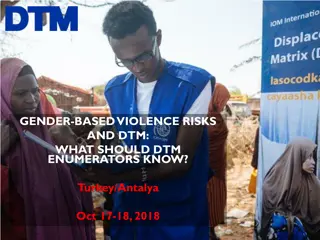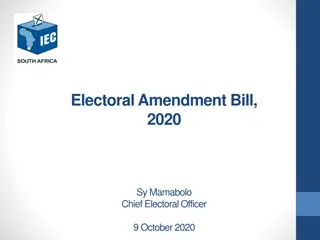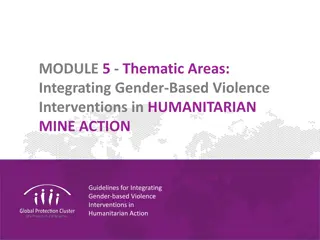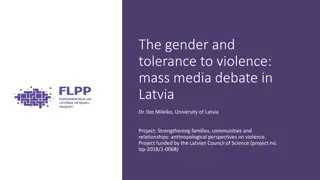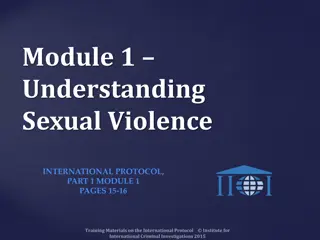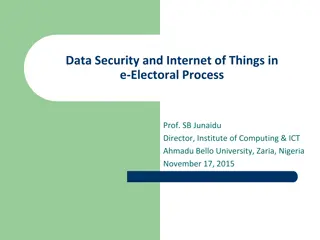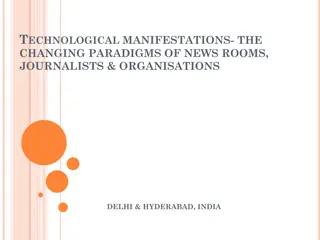Journalists' Role in Addressing Gender-Based Electoral Violence: Discussion Guide
This discussion guide focuses on the role of journalists in mitigating gender-based electoral violence, specifically within the context of training Synergy Journalists in Kogi State, Nigeria. It covers topics such as the Common Ground Approach, different forms of violence, perpetrators, effective reporting, and collective commitments. Participants explore the definition of violence against women in elections, identifying various acts of violence, and understanding the disproportionate impact on women in society.
Download Presentation

Please find below an Image/Link to download the presentation.
The content on the website is provided AS IS for your information and personal use only. It may not be sold, licensed, or shared on other websites without obtaining consent from the author.If you encounter any issues during the download, it is possible that the publisher has removed the file from their server.
You are allowed to download the files provided on this website for personal or commercial use, subject to the condition that they are used lawfully. All files are the property of their respective owners.
The content on the website is provided AS IS for your information and personal use only. It may not be sold, licensed, or shared on other websites without obtaining consent from the author.
E N D
Presentation Transcript
The Role of Journalists in Mitigating Gender-based Electoral Violence Being a Discussion Guide to Search for Common Ground Training of Synergy Journalists Kogi State, Nigeria November 4-5 2015
PRESENTATION OUTLINE Introduction: Common Ground Approach Differentiating gender-based electoral violence Stimulants Perpetrators Effective reporting of acts of violence and impunity Our collective commitments
Introduction Discuss the Common Ground approach: Election and leadership are not products of war This approach is service-driven Violence creates barriers, depletion and inbalance
What constitutes VAW-E Physical violence (dragging a person from the polling station, forcibly taking a person s voter card, assault, beating, murder) Sexual violence (rape, sexual harassment, men and women on the same queue, sexual exploitation, sexual gratification) Psychological (hate language, slander, character attacks, divorce, defamation, false accusations,) Threats and coercion (death threats, threat of bodily harm, coercion to vote a particular candidate, threat to harm family, threat of divorce) Economic (withholding of resources, destruction of property)
Defining VAW-E Any act of gender-based election violence that is directed primarily at women, and that is a result of their aspirations to seek political office, their link to political activities or simply their commitment to vote; as well as any use or threat of force to harm persons or property with the intention of influencing the electoral process that has a disproportionate impact on women because of their marginalized and vulnerable status in society.
Acts of violence against women Verbal harassment Rape Murder/Assassination Family violence Mental harassment (psychological) harm Issuing of threats of violence to self or family members Robbery Domestic violence Sexual harassment Death Threats Threats of violence Damage to personal property/arson Physical/bodily harm/beatings
Acts of violence against women contd Damage to campaign offices Gender hate speech Destruction of election materials -- snatching of ballot papers, boxes Denial of mandate Refusal to allow women to buy form Promised on gender parity not kept Not consulting women on processes Gender-blind delegate composition Media denial of voice, programming and presence Public stripping
Reasons for VAWIE VAW-E is used as a targeted and destructive tool in various ways throughout the electoral cycle to dissuade women from participating as election administrators, voters, supporters, and candidates. This has critical implications for the integrity of the electoral process because when women are prevented from voting for their preferred candidates, executing their campaigns, or fulfilling their mandate, democratic processes are effectively nullified
Reasons for VAW-E contd Research by UN Women and the Institute for Democracy in Africa on VAW-E in 2011 elections in Nigeria revealed that women aspirants and voters were kidnapped, beaten up, sexually assaulted and shot at in order to deter them from participating in elections. Women are more often the victims than the perpetrators of electoral violence in Nigeria
Reasons for VAW-E contd Opposition to women s leadership Economic dependency Illiteracy/lack of education Discriminatory social and cultural attitudes Culture of violence (particularly political violence) Absence of supportive administrative and judicial structures including inadequate rule of law and governance institutions. What are Root Causes of VAW-E in Nigeria?
Categorization of perpetrators Election worker Community Traditional/religious leaders Security agents Family members Party activists Paid thugs CSOs State Political parties Media Medical personnel
Some effects of violence on electoral process: Preventing observers from observing the elections Preventing voters from voting Preventing voters from voting for preferred candidate Distracts the entire process Candidates drop out of the race Disrupts registration and accreditation
Reporting acts of VAW-E Journalists have the ability and capacity to make VAW-E more visible and talked about so that in the short term it may be mitigated and in the long term solutions can be identified and in turn increase the electoral integrity and prospects for democratic elections. Violence against women in electoral process should be a major focus during political and electoral process reporting as it has the capacity to render the whole process invalid and rejected
Some stop VAW-E initiatives The overall aim of the Stop-VAWIE project is to mitigate violence against women during elections and encourage women political participation 1. To collate, analyze, document and share data on incidence of violence against women in elections 2. Create advocacy with relevant stakeholders to address issues of violence against women in elections 3. Train women groups on how to create awareness campaigns on violence against women in election and develop mitigating strategies. The campaign has been launched nationally in Abuja, and at state level in Kogi and Bayelsa. The launch was geared towards creating widespread awareness on the project. The training for FIDA was to create an understanding on what constitutes violence against women in elections and to encourage women to report cases accordingly. Tools for data collection are: TMG Quick count Observers, a hotline and focus group discussions. The campaign also has an Ambassador: Stephanie Linus, a popular Nollywood actress, serving as the face of the project
